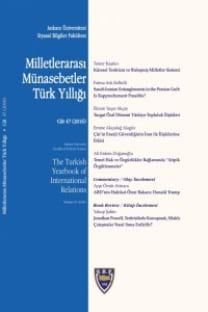The Role of the Muslim Minorities in Interstate Relations in the Balkans
The Role, Muslim Minorities, Relations
The Role of the Muslim Minorities in Interstate Relations in the Balkans
- ISSN: 0544-1943
- Yayın Aralığı: 1
- Başlangıç: 1960
- Yayıncı: Ankara Üniversitesi Siyasal Bilgiler Fakültesi Uluslararası İlişkiler Bölümü
The Role of the Muslim Minorities in Interstate Relations in the Balkans
The Etiology of Racism in Europe
Mehmet SUPHİ, Abdülkadir ÇELİK, Birsen CEYHUN
Struggle for East-European Empire: 1400-1700
From the Ottoman Experiment in Local Government to the First Constitutional Parliament of 1876-1877
Double Standards in Recent American Foreign Policy
Political Attitudes of Students in the United States Turkey and Turkey and North Cyprus
Eddie J. GİRDNER, Russell EİSENMAN, Sevgin AKIŞ
The Question of Jerusalem in the Cold-War Era
The Rise and Fall of the Wealth of Nations
